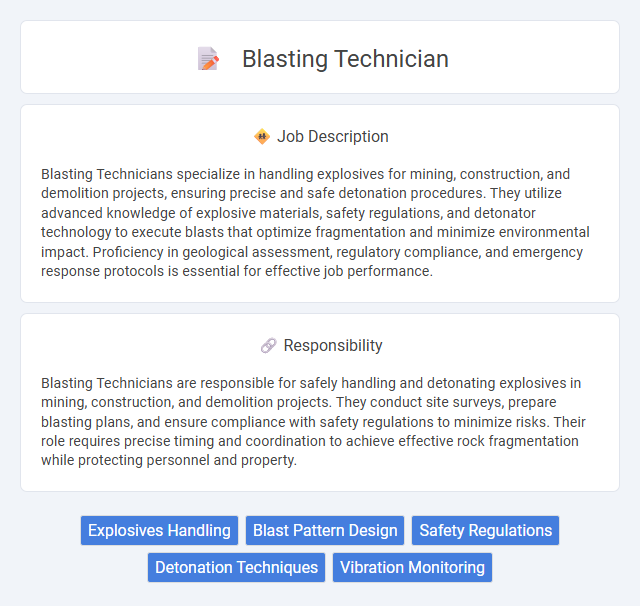
Blasting Technicians specialize in handling explosives for mining, construction, and demolition projects, ensuring precise and safe detonation procedures. They utilize advanced knowledge of explosive materials, safety regulations, and detonator technology to execute blasts that optimize fragmentation and minimize environmental impact. Proficiency in geological assessment, regulatory compliance, and emergency response protocols is essential for effective job performance.
Blasting Technicians may be more suitable for individuals who are physically fit and comfortable working in high-risk environments, as the job often involves handling explosives and operating heavy machinery. Those with a strong attention to detail and the ability to follow strict safety protocols are likely to perform better in this role. People who are prone to anxiety or have difficulty managing stress might find this occupation challenging due to its demanding and hazardous nature.
Qualification
Blasting Technicians require specialized training in explosives handling, safety protocols, and regulatory compliance to ensure precise and secure detonation processes. Candidates must hold certifications such as the Occupational Safety and Health Administration (OSHA) explosives safety training and demonstrate proficiency in risk assessment and site surveying. Strong knowledge of geology, physics, and environmental impact mitigation is essential for effective job performance.
Responsibility
Blasting Technicians are responsible for safely handling and detonating explosives in mining, construction, and demolition projects. They conduct site surveys, prepare blasting plans, and ensure compliance with safety regulations to minimize risks. Their role requires precise timing and coordination to achieve effective rock fragmentation while protecting personnel and property.
Benefit
Blasting Technicians likely enjoy competitive salaries due to the specialized skills required in handling explosives safely. There is a strong probability of career advancement in mining, construction, and demolition industries, offering job stability and growth opportunities. Benefits may also include comprehensive safety training and access to advanced technology, enhancing both professional development and workplace safety.
Challenge
Blasting Technicians likely face significant challenges related to ensuring safety while handling volatile explosives in controlled environments. They must probably adapt constantly to evolving regulations and technological advancements to minimize risks and improve efficiency. The role demands meticulous attention to detail and strong problem-solving skills to successfully manage complex blasting operations.
Career Advancement
Blasting Technicians specializing in explosives handling and controlled demolitions experience significant career advancement through certifications such as Certified Explosives Technician (CET) and participation in advanced safety and environmental training programs. Gaining expertise in mine blasting, construction demolition, or seismic exploration enhances job prospects and salary potential, often leading to supervisory or project management roles. Mastery of regulatory compliance and innovative blasting technologies further propels career growth in industries like mining, oil and gas, and infrastructure development.
Key Terms
Explosives Handling
Blasting Technicians specialize in handling explosives with precision, ensuring safe and effective detonation for construction, mining, and demolition projects. Their expertise includes selecting appropriate explosive materials, setting charges, and adhering to strict safety protocols to prevent accidents. Mastery in explosives handling reduces risk and maximizes operational efficiency in controlled blasting environments.
Blast Pattern Design
Blasting Technicians specializing in Blast Pattern Design are responsible for creating precise explosive layouts to ensure controlled rock fragmentation and minimize environmental impact. Expertise in geological assessment and explosive material selection is essential for optimizing blast efficiency and safety. Advanced software tools enable detailed modeling of blast patterns, improving fragmentation uniformity and reducing operational costs in mining and construction projects.
Safety Regulations
Blasting Technicians must rigorously adhere to safety regulations set by organizations such as the Occupational Safety and Health Administration (OSHA) and the Mine Safety and Health Administration (MSHA) to prevent accidents and ensure safe handling of explosives. Proper training in explosive materials, risk assessment, and emergency response protocols is essential for compliance with industry standards like the Bureau of Alcohol, Tobacco, Firearms and Explosives (ATF) regulations. Continuous monitoring of blast zones, use of personal protective equipment (PPE), and adherence to environmental and local government safety guidelines minimize hazards during blasting operations.
Detonation Techniques
Blasting Technicians specialize in advanced detonation techniques to ensure precise and controlled explosions for mining, construction, and demolition projects. Mastery of various initiation systems, including electric, non-electric, and electronic detonators, allows them to optimize blast patterns for maximum efficiency and safety. Their expertise reduces environmental impact while improving fragmentation and ground vibration control.
Vibration Monitoring
Blasting Technicians specializing in Vibration Monitoring play a critical role in assessing and controlling ground vibrations caused by explosive blasts to ensure compliance with safety and environmental regulations. They utilize advanced vibration monitoring systems and seismographs to measure peak particle velocity (PPV) and frequency, minimizing the risk of structural damage and protecting nearby communities. Precise data analysis and reporting enable effective blast design adjustments, optimizing both safety and operational efficiency in mining, construction, and demolition projects.
 kuljobs.com
kuljobs.com